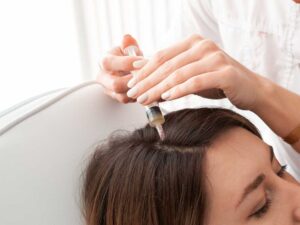Hair Loss From Stress? Here’s What You Can Do to Restore Your Hair
 If you’ve been experiencing a lot of stress, you might be noticing various changes in your body. One sign of stress can be hair loss or thinning, which can be distressing and affect your overall appearance. Restoring your healthy hair may require a combination of lifestyle changes and customized hair loss treatments.
If you’ve been experiencing a lot of stress, you might be noticing various changes in your body. One sign of stress can be hair loss or thinning, which can be distressing and affect your overall appearance. Restoring your healthy hair may require a combination of lifestyle changes and customized hair loss treatments.
At Essence Skin Clinic & Med Spa in Rochester, MN, we have experience in addressing both medical and aesthetic concerns. As the first med spa in the area, we are well-equipped to help our patients find effective solutions for hair loss. Our approach focuses on creating a plan that fits your unique situation, combining the latest treatments with practical lifestyle adjustments.
How Much Hair Loss Is Normal?
It’s normal to lose some hair daily as part of the natural hair growth cycle. Typically, losing 50 to 100 hairs a day is considered standard. If you notice more significant hair loss, it might be time to explore potential underlying causes.
Does Stress Cause Hair Loss?
Yes, stress can contribute to hair loss due to stress. When you’re under a lot of pressure, your body can react in ways that disrupt the normal hair growth cycle. This disruption can lead to noticeable thinning or shedding.
Understanding Stress-Related Hair Loss
Stress impacts the body in various ways, and hair loss is one of them. Acute stress can trigger sudden shedding, while chronic stress may lead to gradual thinning over time. The body’s stress response can interfere with hair follicle function, resulting in different patterns of hair loss.
Cortisol and Hair Follicle Health
High cortisol levels, a hormone released during stress, can negatively affect hair follicles. This connection between cortisol and stress hair loss can lead to weakened hair follicles, making them more prone to shedding. Managing stress effectively is crucial for maintaining healthy hair.
How Stress Causes Hair Loss in Different Situations
Telogen Effluvium
Telogen effluvium is a condition characterized by diffuse thinning hair across the scalp. It occurs when a significant number of hair follicles enter the resting phase (telogen) prematurely due to stress. Stress and hair loss are closely linked in this condition since stress can be a major trigger. Symptoms include sudden shedding and noticeable thinning of hair, often several months after a stressful event.
Alopecia Areata
Alopecia areata is an autoimmune disorder where the immune system attacks hair follicles, leading to hair loss. Stress can exacerbate this condition by triggering an immune response that targets hair follicles. Symptoms include patchy bald spots on the scalp, eyebrows, or other areas of the body, with hair loss occurring rapidly and often unpredictably.
Trichotillomania
Trichotillomania is a compulsive hair-pulling disorder that results in noticeable hair loss due to stress. Individuals with this condition often pull out hair from their scalp, eyebrows, or other parts of the body, typically as a way to cope with stress or anxiety.
Identifying Stress Triggers for Hair Loss
Understanding what triggers hair loss from stress is key to managing and preventing it. Common triggers include significant life changes, work-related stress, and emotional trauma. Identifying these triggers can help in developing strategies to reduce stress and mitigate its impact on hair health.
How to Reverse Hair Loss From Stress
Manage Stress Levels
While you can’t always control the situations that are causing your stress, there are techniques you can use to reduce stress and any thinning hair caused by stress. Start with a foundation of healthy habits including getting adequate sleep whenever possible, establishing a regular exercise routine, and reducing processed or sugary foods that can make stress worse. Incorporate relaxing and enjoyable activities such as time outside, hobbies that you enjoy, and time with supportive friends. Consider professional counseling or therapy if stress feels unmanageable.
Focus on Stress-Supporting Nutrition
Proper nutrition can help combat hair loss from stress. Incorporating foods rich in vitamins and minerals, like leafy greens, nuts, and fish, promotes hair health. Supplements such as biotin, vitamin D, and omega-3 fatty acids can also support hair growth if you don’t get enough from your diet.
Use Gentle Hair Care Practices
Adopting gentle hair care practices can help minimize hair loss. Avoid harsh treatments like frequent coloring or excessive heat styling. Use mild shampoos and conditioners, and be gentle when brushing or detangling hair. Letting your hair air dry and avoiding tight hairstyles can reduce strain on hair follicles.
Consider Hair Restoration Treatments
For those seeking more direct solutions, hair restoration treatments can be effective. You can consider our Alma TED hair restoration treatments if you notice thinner hair.
Alma TED Hair Restoration Treatments
Alma TED is a thinning-hair treatment that uses ultrasound technology to promote hair growth. This non-invasive treatment combines sound waves with air pressure to enhance the absorption of hair growth serums into the scalp. The treatment treats hair follicles directly and can be a good option for those experiencing hair loss due to stress.
Some of the Benefits of Alma TED
Alma TED offers several benefits for those dealing with stress hair loss. This treatment is non-surgical, making it a comfortable and convenient option. It can improve hair density and thickness by stimulating dormant hair follicles. Alma TED is suitable for various hair types and requires no downtime, so the treatment doesn’t add to the stress of busy individuals.
What to Expect From Alma TED Treatments
Alma TED hair restoration treatments last around 30 minutes, during which the ultrasonic device is applied to the scalp. Patients may feel a mild tingling sensation as the treatment enhances serum absorption. Multiple sessions are usually recommended for optimal results, with noticeable improvements often seen within a few months.
Post-Treatment Care for Hair Restoration Treatments
After an Alma TED thinning-hair treatment, following specific post-care guidelines can help maintain and enhance results. It’s advisable to avoid washing the hair for 24 hours to allow the serum to fully absorb. Gentle hair care practices, such as using mild shampoos and avoiding excessive heat styling, can protect newly stimulated follicles. Regular follow-up sessions may be recommended to sustain hair growth and achieve the best possible outcome.
Overcoming Stress and Hair Loss With Effective Strategies
Effective management of hair loss due to stress involves a combination of lifestyle adjustments and professional treatments. Understanding the relationship between stress and hair loss is crucial for finding the right solution. At Essence Skin Clinic & Med Spa in Rochester, MN, we offer advanced treatments like Alma TED to help you regain healthy hair. To learn more or schedule a consultation, contact us online or call us at (507) 285-5505.
Share:
More Posts

Who Is a Good Candidate for the Skinny Shot?
As the active ingredient in “the skinny shot,” including wildly popular injectables like Ozempic, semaglutide leaves little doubt at this point when it comes to

The Alma TED Procedure: A Needle-Free Look at Hair Restoration
Pro athlete or couch potato, it doesn’t matter — hair loss is an equal opportunity vibe killer. Thankfully, we live in a time where noninvasive

How Long Does Laser Hair Removal Last? A Comprehensive Guide
If you’ve been experiencing a lot of stress, you might be noticing various changes in your body. One sign of stress can be hair loss

The Dos and Don’ts: How Often to Get Botox® for Best Results
Regular Botox treatments can help your skin look more youthful by addressing and preventing the appearance of fine lines and wrinkles. At Essence Skin Clinic


